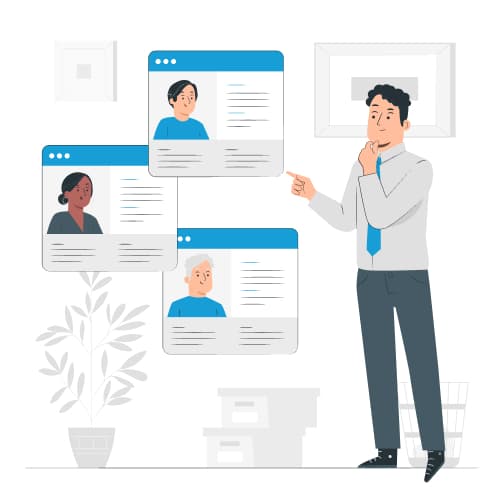A CRM software basically is a sales support tool. It helps sales teams in their daily tasks. Today, personal data, personalization and privileged relationships based on trust are essential to face an increasingly competitive market. To help you face these new challenges, different software products are efficient, varied and specialized to meet your needs. In this article we will show you what a CRM is about.
Definition
CRM stands for Customer Relationship Management or Gestion de la Relation Client (GRC) in French. The aim is simple: optimize the relationship and commercial communications between a prospect or customer and the company. By storing and organizing the data and the exchanges with a contact, it is easy to adapt your sales pitch and organize your follow-up agenda. You can identify qualified leads, collect a customer's sensitive points, organize your actions, etc.

CRM or ERP?
It’s not always easy to find your way through all these acronyms! Here is a small summary table to help you understand them better.
As a reminder, an ERP stands for Enterprise Resource Planning. It is a tool for managing and planning your production.
|
CRM |
ERP |
|
|
portfolio monitoring |
X |
|
|
customer loyalty |
X |
|
|
automated tasks |
X |
|
|
scheduling |
X |
X |
|
inventory management |
X |
|
|
account management |
X |
|
|
production management |
X |
Background
Business tools have always existed. Here is a short history of CRM software:
- 1980s: birth of relational database management systems (RDBMS), the ancestor of CRM.
- Late 1990s: birth of CRM, attributed to Gartner or Thomas Siebel.
- 2000: evolution of CRMs with the Cloud and the SaaS model / synchronization with marketing automation
- 2010: democratization of CRMs, which are now open to smaller companies.
What does a CRM software do?
A CRM has several important roles. It is involved in several areas such as sales, support, marketing and provides a 360° view of customers.
Firstly, contact records are created, containing information about the person, the company and the exchanges.
Then the support and customer service. By keeping key information, you can identify the sensitive points in the relationship with your customers and can thus personalize your exchanges accordingly.
Finally, sales analysis. You keep all the important statistics in your CRM. Deals won, lost, opened, the time between the proposal and the conclusion are all information to be analyzed thanks to a CRM.
A CRM tool brings many advantages such as customer loyalty, time saving and aims to increase the company's turnover.
The key features of a CRM software
Prospection
Prospection is a big part of a CRM software. Identifying the right contacts, their details, their roles in the company, this is the principle of the tool. By having a 360° vision of the customers, you increase your chances to close your opportunities.
To do this, the functionalities that should not be overlooked are
- centralization of contact information
- the history of exchanges
- alerts for follow-ups
Organization
A CRM tool is also designed to help you organize your sales activities.
You are able to see at a glance the prospect in progress, for you as well as for the whole sales team! By organizing your follow-ups in the best possible way, you optimize your chances of closing your opportunities.
To do this, there are several features:
- a clear calendar
- user rights management
- synchronization of your CRM with your usual calendar
Invoicing
CRM software can also help you with invoicing. You will be able to centralize all your data including the invoicing of your customers. Indeed, it is the place where you centralize the contact information, so it is logical to make your invoices in the same software. The same goes for quotes and signing opportunities.
For this, here are the useful functionalities:
- invoice generation
- electronic signature
- synchronization with an accounting tool
Best CRM software to start with
A CRM software can be useful from the very beginning of a company. In fact, this tool can be extremely useful for a self-employed person or a small company. Whatever the size of your business, you respond to a demand. To prospect and build loyalty among your customers, a CRM can be very useful. Here are some free CRMs that can be really useful!
Zoho CRM
All the necessary features, an unlimited number of contacts and clear reports, that's the promise of Zoho CRM. You won't be disappointed with your investment. Because it is an investment of time to get to grips with it, for the small negative point!
Hubspot CRM
No doubt this rings a bell! 1 million contacts can be managed with this tool, all the features you would expect in a CRM and much more. Small alert: it can be a bit confusing at first.
Webmecanik Pipeline
The simplest CRM. There are no nasty surprises or difficulties in getting used to this very intuitive software. Your data is stored in Europe, all the essential features are there and this tool is in full development! Stay tuned!
Best CRM tools for a large group
Pipedrive
Rather easy to use, this software focuses on the essentials of CRM. The marketing functionalities are not numerous but it is possible to synchronize it with marketing automation softwares such as Webmecanik Automation. On the other hand, this software can be quite expensive.
Webmecanik Pipeline
This CRM tool is similar to Pipedrive, simple and efficient on the essentials of a CRM. Based in France, it guarantees compliance with the GDPR, which is essential in view of the possibly sensitive information you will be storing.
Salesforce
A lot of customization is possible with this well-known and widespread tool. The advantage is that you have many possibilities of integration with other tools! On the other hand, it can quickly become expensive and complex to use.


